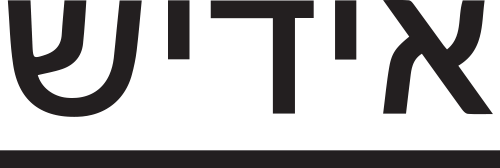This Blog post is the first in a series where we’ll share a deeper look into some of the qualitative research and quantitative data that we’ve gathered and analyzed on the yeshiva sector. We’ll soon have the ability to map out in a much clearer fashion just how well New York’s yeshivas are performing, allowing us to take a more cohesive look at the sector. Stay tuned to the YAFFED blog for more very soon!
This first post will focus on data from the 28 yeshivas that were investigated by the New York City Department of Education between 2015 and 2023, following a complaint filed by more than 50 former students and parents of Hasidic and Haredi yeshivas. The DOE released its final report in July 2023, determining that 18 of the 28 yeshivas failed to provide a substantially equivalent education in English, math, science, and history. Using a combination of publicly available data from NYSED, and acquiring data related to testing and funding via Freedom of Information Law, we were then able to compile data on enrollment and Statewide standardized testing scores for the yeshivas named in the investigation, and we’re able to share some of the insights we’ve learned from this data.
Obtaining data on these schools is difficult, time-consuming, and requires engagement with multiple public agencies as well as the use of the Freedom of Information Law to unearth information. Accessible data is critical – for families to have the security of knowing whether their child’s school satisfies the compulsory education law by providing a sound basic education, for education authorities to be best equipped for delivering proper oversight and assistance to schools and students who need it most, and for advocacy groups like us who have a stake in ensuring access to quality education for all.
The Schools
Which schools were investigated by NYC DOE?
In YAFFED’s 2015 complaint, parents of current students, former students, and former teachers expressed their concern over the poor quality of instruction, particularly in English, at 39 schools, urging NYC DOE to take action. Within a day, City officials had confirmed that an investigation would take place. (In a statement at the time, Mayor Bill De Blasio said “The city takes its responsibility to address any complaint very seriously. Everyone is held to the same standard, and there is zero tolerance for the kind of educational failure alleged“, before demonstrating an astounding amount of tolerance for the kind of educational failure alleged).
Over the course of its 8-year investigation, the NYC DOE narrowed down the scope of its evaluations to 28 schools. The 28 schools are listed below with their BEDS code (a unique identifier used by the state for tracking individual schools). Read on below for enrollment data from these 28 schools, as well as more details on their final substantial equivalency determination and their status in the state’s remediation plan.
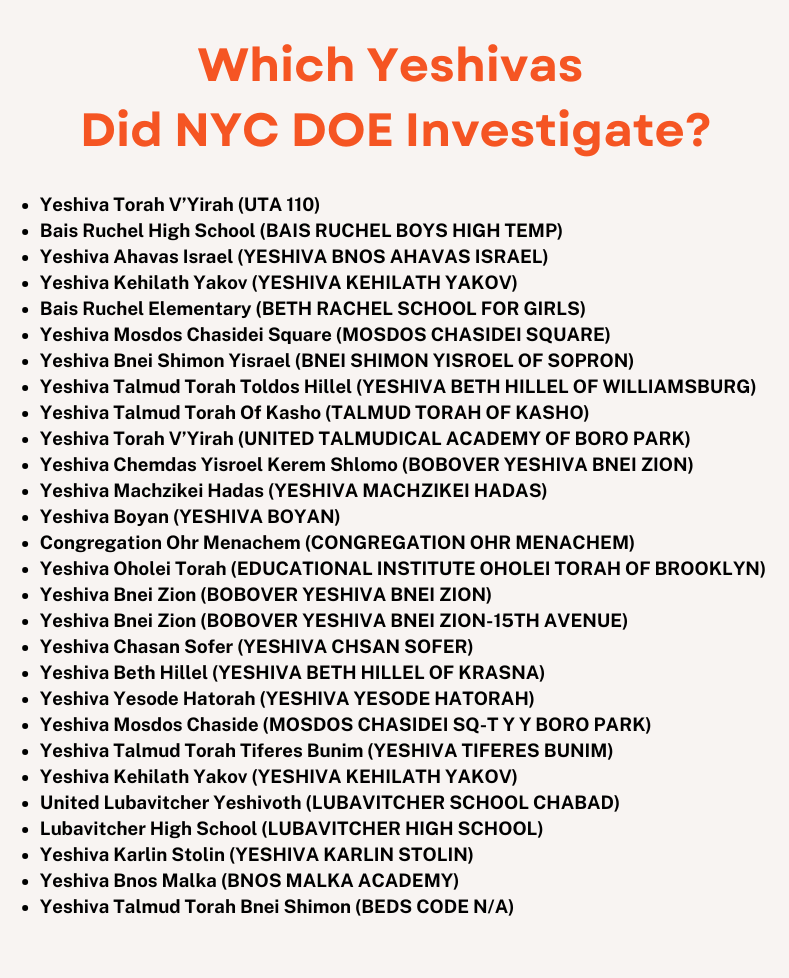
The Data
According to enrollment data on file with the State Education Department, the 28 schools investigated served 14,482 students in 2023. As a comparison, the entire Rochester school district had 42 schools serving 17,474 students during the same school year. Even though it might seem like a relatively minor subset of the entire Hasidic yeshiva system (which is estimated to include well over 100,000 students), these 28 schools are serving a significant number of students.
The average enrollment of each yeshiva named in the final DOE report was about 536 students.
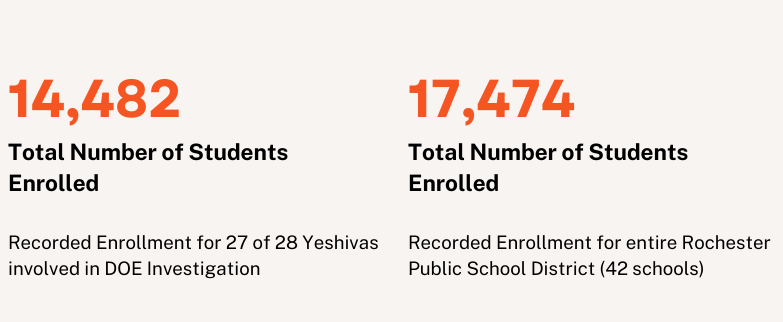
The yeshivas in the report scored significantly lower on standardized proficiency testing in English and Math than the overall statewide average.
On standardized English exams, the overall total of students scoring as proficient (scoring a “3” or higher out of a possible “4”) in these yeshivas was just over 11%, compared to a statewide average of 47%. On standardized math exams, only 9% of students in these yeshivas scored as proficient, compared to a statewide average of 39%.
Note: Nonpublic schools are not required to participate in New York State’s standardized assessments. These tests are offered to all schools (public schools are required to participate) for their students in grades 3 through 8. Of the 28 yeshivas investigated as a result of YAFFED’s 2015 complaint, only 14 participated in the ELA and math tests in 2021 (the most recent year for which data is available). This data was FOIL-ed from the New York State Education Department.
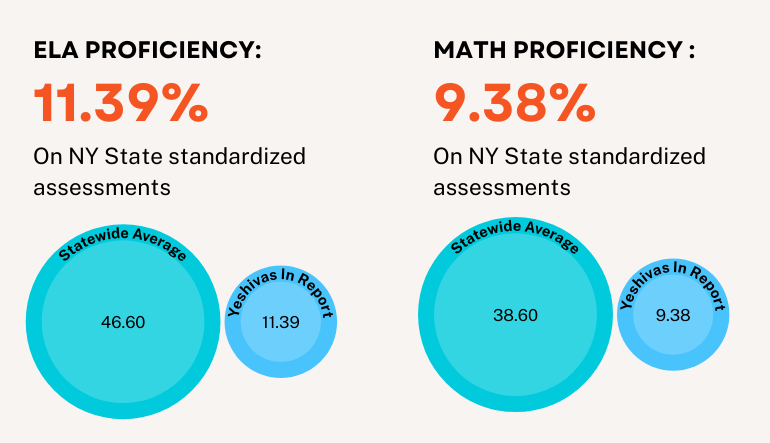
Of the 14 yeshivas participating in statewide standardized testing, 35% of them did not have a single student score as proficient in English. The total enrollment in 2023 of the schools with a 0% proficiency rate on ELA exams was 1470 students. Only 1 yeshiva out of 28, Bnos Malka Academy, had a rate of proficiency above 50% in any subject, with a 59% ELA proficiency rate.
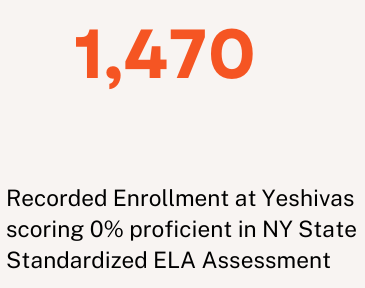
Another troubling statistic from our analysis of test scores is the rate of students who scored a perfect 4/4 on standardized English and Math assessments. That a small number of students vastly outperformed their peers on assessments while receiving the same subpar instruction in school is not particularly shocking, considering the prevalence of private tutoring among the more economically advantaged families within the Hasidic community. Out of 14,482 students in the yeshivas investigated, only 99 demonstrated total English proficiency via standardized assessments. In math, only 70 demonstrated total proficiency via standardized assessments.


What is of grave concern here is that even those precious few students who against all odds have managed to excel in grades 3 through 8 will see their prospects for a quality education dwindle significantly as they reach High School. There, they will no longer receive even the 90 minutes of instruction by unqualified teachers they had received in Elementary School, and a more demanding schedule with increased hours in yeshiva will limit their ability to spend time with tutors after school.
Of these 28 schools, which ones failed to provide a substantially equivalent education, and what happens next?
According to the findings of NYC DOE’s 8-year investigation, a total of 18 yeshivas out of the 28 failed to meet the legal education requirement to provide instruction that is “substantially equivalent” to that of local public schools. At 4 of the schools, (Yeshiva Bnei Shimon Yisroel of Sopron, Yeshiva Kerem Shlomo/Bobover Yeshiva Bnei Zion, Yeshiva Oholei Torah, and Yeshiva Ohr Menachem) New York City Education Chancellor David Banks wrote letters to the school administration detailing the results of the DOE findings and informing them that they have 60 days to begin working with the DOE on a plan for reaching compliance with education law. The other 14 schools were referred to the New York State Education Department for final determination.

Since the close of the investigation in June of 2023, the courts have clarified the ability of the State Education Department to enforce education law by declaring any school not meeting substantial equivalency requirements as no longer meeting the definition of a school. Receiving such a determination would jeopardize a school’s ability to continue to receive state funding for the many available public funding streams that nonpublic schools are eligible to receive, such as MSA, CAP, MST, NPSE, AID, LTG, and others. The statewide deadline for all schools to demonstrate compliance via Local School Authority assessments is June 30, 2025. As that date approaches, we’ve already seen NYSED begin to issue final determinations of non-compliance to schools due to their refusal to engage with the review process. As of March 2025, NYSED has already contacted 6 yeshivas to inform them that they will no longer be considered a school that satisfies the compulsory education requirement after this current school year. As always, you can count on YAFFED to keep you informed on the latest developments in our movement to ensure a sound basic education for all children in New York.
YAFFED depends on your support to power our work. Help us continue to advocate for educational rights with a one-time or monthly donation today.

